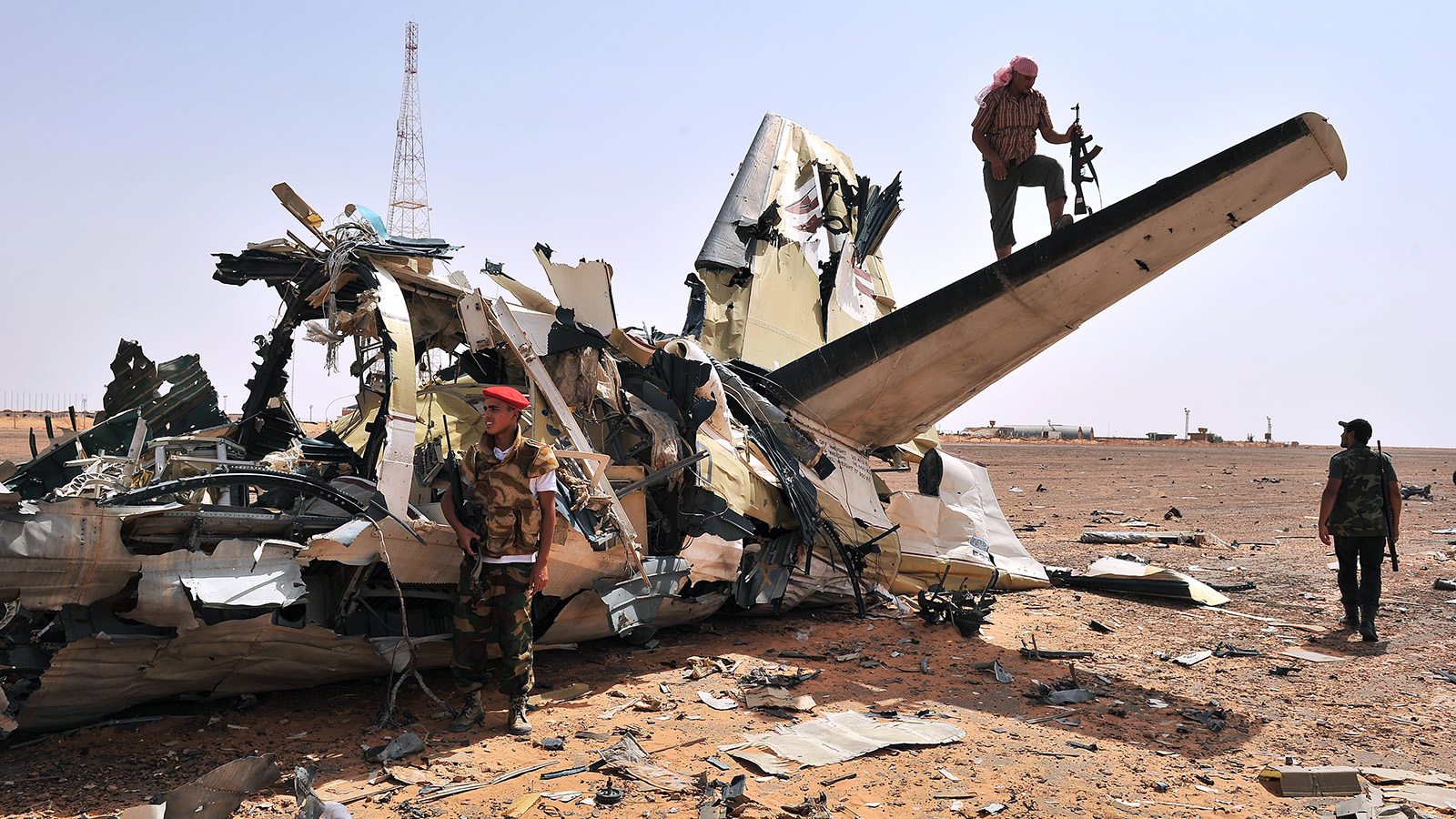Editorial: Air strikes can only do so much in Iraq
Bombing may blunt the progress of Islamic insurgents, but history tells us air power has limited results
Rebels inspect an airplane destroyed by a NATO air strike at the Bir Durfan military base close to Bani Walid, on September 4, 2011. A special envoy for UN Secretary General Ban Ki-moon arrived in Libya as Libya’s National Transitional Council have stepped up efforts to bring order and democracy to the country. AFP PHOTO/Carl de Souza (Photo credit should read CARL DE SOUZA/AFP/Getty Images)
Share
The West can leverage technological superiority to make political points at will. But success in the air is not the same thing as a successful outcome.
Since man first took flight, military strategists have argued that air power held the ability to change war forever. “To gain command of the air,” wrote Italian General Guilio Douhet in 1912, is to render your opponent “harmless.” In nearly every conflict that’s followed, control of the skies has been seen as crucial to victory, from dropping the first atomic bomb to modern drone surveillance. The United States is the world’s only superpower, largely because of its unrivalled ability to project its air power anywhere in the world. Yet, as significant as air superiority may be, there’s growing evidence of its limitations, as well. It will never be a bloodless alternative to boots on the ground. And it certainly isn’t the solution to complex civil wars.
Last week, in the latest example of America’s ability to send jets wherever it chooses, President Barack Obama announced a new campaign of air strikes in Iraq against the Islamic insurgency, ISIS. In conjunction with arms delivered to Kurdish forces in northern Iraq—and in the absence of any American troops in the country—the air offensive is designed to blunt the recent progress of ISIS. Whatever success the U.S. may enjoy over Iraq, however, will inevitably be transitory and do little to fix the real problems at hand. History has repeatedly proven that it’s impossible to win war solely from the air.
During the Second World War, strategic bombing was unable to break the will of civilian populations in Allied or Axis cities. More often than not, it simply strengthened popular resolve against a common enemy. And, while the U.S. enjoyed unambiguous control of the air in Vietnam, this advantage never delivered victory.
More recently, the advent of precision-guided missiles, stealth fighters and unmanned high-resolution surveillance have raised expectations that victory from the air is finally possible, and in a way that limits both civilian and offensive casualties. The 1999 NATO bombing campaign in Kosovo, which included 18 Canadian CF-18s, led to the ouster of Serbian president Slobodan Milosevic and was widely seen as proof of concept. It also set a dangerous precedent.
The sequel to Kosovo was NATO’s 2011 Libyan adventure, in which Canada played an even bigger role. Led by Canadian Lt.-Gen. Charles Bouchard and including seven CF-18s, NATO’s Operation Unified Protector eliminated Libyan leader Moammar Gadhafi’s military advantage over local rebel forces during a popular uprising—the goal once again being regime change from a distance. After several months, the rebels overran the country and murdered Gadhafi. Despite the relative ease with which this was accomplished, however, the end result now looks like a complete failure. Without any postwar plan or Western military presence on the ground, constant fighting between disparate rebel factions has left Libya in ruins. Canada recently closed its embassy and evacuated all diplomats.
Air power made it simple and inexpensive to destroy Libya’s existing political regime and military might. But it’s impossible to rebuild a country from the air. Now, it appears the same situation may be playing out in Iraq. That country also appears perched on the verge of political chaos and a potential civil war. While American aerial firepower can make life difficult for ISIS, without reliable ground forces in situ, the fate of Iraq as a federal state seems very much in doubt.
Herein lies the conundrum of modern air power. Western nations can now leverage overwhelming technological superiority in the air to make political points at will, or aid whatever local ally they choose—and in a way that avoids the difficulties of putting their own soldiers in harm’s way. Given these many advantages, we can expect more aerial interventions in the future. But success in the air is not the same thing as a successful outcome. Despite massive advances, air power is still no substitute for boots on the ground. (Air power can also create a false sense of security. Despite Israel’s unhindered control of the skies over Gaza and its Iron Dome defence system, not until it physically invaded the territory did it discover the full extent of Hamas’s tunnel infrastructure.) Achieving permanent peace in a conflict zone will always be a messy, complicated and time-consuming business.
Just how long it can take to rebuild a country riven by civil war was driven home by retired senator and former Canadian general Roméo Dallaire in a recent discussion with Maclean’s (The Interview, July 21). The UN peacekeeping mission in Cyprus, in which Canada has played a key role, is now 60 years old, Dallaire noted. And “it might take another generation, another 20 years” before Cyprus is finally fixed. Afghanistan may be 70 years away from a peaceful and permanent conclusion to its problems, he said. Doing so inevitably requires that “we will spill some blood.”
As quick and effective as air strikes may be in winning battles, politicians must keep in mind the limitations of air power, as well. Real solutions to big problems are measured in decades, not sorties.
